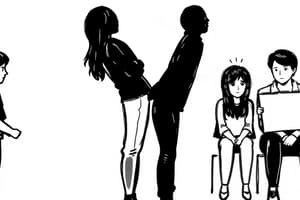Podcast
Questions and Answers
Cyberbullying can occur 24/7 and is not confined to a specific location.
Cyberbullying can occur 24/7 and is not confined to a specific location.
True (A)
Boys are less likely to be bullied compared to girls.
Boys are less likely to be bullied compared to girls.
False (B)
Direct bullying occurs when the bully and the victim interact face to face.
Direct bullying occurs when the bully and the victim interact face to face.
True (A)
As children age, they are more likely to engage in direct bullying rather than indirect bullying.
As children age, they are more likely to engage in direct bullying rather than indirect bullying.
Signs of bullying can include having unexplained injuries and being alone during breaks.
Signs of bullying can include having unexplained injuries and being alone during breaks.
Bullying incidents among students are considered serious.
Bullying incidents among students are considered serious.
All bullying behaviors can be classified as innocent jokes between children.
All bullying behaviors can be classified as innocent jokes between children.
Bullying is a natural part of growth and helps empower children.
Bullying is a natural part of growth and helps empower children.
Verbal bullying is considered less serious than physical bullying.
Verbal bullying is considered less serious than physical bullying.
According to Olweus, a person is bullied if they are regularly exposed to negative actions by one or more individuals.
According to Olweus, a person is bullied if they are regularly exposed to negative actions by one or more individuals.
Bullying can occur in competitive environments that intentionally make others feel inferior.
Bullying can occur in competitive environments that intentionally make others feel inferior.
All bullies possess low self-esteem.
All bullies possess low self-esteem.
Ignoring bullying will lead to its natural cessation.
Ignoring bullying will lead to its natural cessation.
Bullying has no psychological effects on victims.
Bullying has no psychological effects on victims.
Bystanders play an important role in the bullying cycle.
Bystanders play an important role in the bullying cycle.
Bullies often exhibit empathy towards their victims.
Bullies often exhibit empathy towards their victims.
Victims of bullying are often characterized as assertive and confident.
Victims of bullying are often characterized as assertive and confident.
Parents of bullies often have a chaotic home background.
Parents of bullies often have a chaotic home background.
The bully's positive self-image can be confused with leadership skills.
The bully's positive self-image can be confused with leadership skills.
Victims of bullying are likely to have close friends for support.
Victims of bullying are likely to have close friends for support.
Victims of bullying tend to react to attacks with aggression.
Victims of bullying tend to react to attacks with aggression.
Physical bullying includes behaviors such as hitting, kicking, and slapping.
Physical bullying includes behaviors such as hitting, kicking, and slapping.
Social bullying often includes actions like making fun of someone's appearance.
Social bullying often includes actions like making fun of someone's appearance.
Cyber bullying can include anonymous attacks on individuals using electronic communication tools.
Cyber bullying can include anonymous attacks on individuals using electronic communication tools.
Verbal bullying only involves physical threats to intimidate the victim.
Verbal bullying only involves physical threats to intimidate the victim.
Sexual bullying can occur through physical, verbal, or digital means.
Sexual bullying can occur through physical, verbal, or digital means.
In social bullying, exclusion from activities is a common tactic used by bullies.
In social bullying, exclusion from activities is a common tactic used by bullies.
An important distinguishing feature of cyber bullying is that the bully can usually be identified easily.
An important distinguishing feature of cyber bullying is that the bully can usually be identified easily.
Damage to personal belongings is a characteristic of physical bullying.
Damage to personal belongings is a characteristic of physical bullying.
Flashcards
Bullying Definition
Bullying Definition
Repeated negative actions by one or more persons towards another over time.
Bullying vs. Competition
Bullying vs. Competition
Bullying is not about natural competition, it's about intentionally causing distress due to power imbalance.
Three Key Factors of Bullying
Three Key Factors of Bullying
Intentional aggression, repeated over time, in a power imbalance relationship.
Olweus' Bullying Definition
Olweus' Bullying Definition
Signup and view all the flashcards
Roland's Bullying Definition
Roland's Bullying Definition
Signup and view all the flashcards
Bullying as Acceptable Behavior
Bullying as Acceptable Behavior
Signup and view all the flashcards
Formal Definition of Bullying
Formal Definition of Bullying
Signup and view all the flashcards
Peer Conflict vs. Bullying
Peer Conflict vs. Bullying
Signup and view all the flashcards
Physical Bullying
Physical Bullying
Signup and view all the flashcards
Verbal Bullying
Verbal Bullying
Signup and view all the flashcards
Sexual Bullying
Sexual Bullying
Signup and view all the flashcards
Social Bullying
Social Bullying
Signup and view all the flashcards
Cyber Bullying
Cyber Bullying
Signup and view all the flashcards
Emotional Stability
Emotional Stability
Signup and view all the flashcards
Extroversion
Extroversion
Signup and view all the flashcards
Anonymity In Cyberbullying
Anonymity In Cyberbullying
Signup and view all the flashcards
What is cyberbullying?
What is cyberbullying?
Signup and view all the flashcards
Constant Accessibility in cyberbullying
Constant Accessibility in cyberbullying
Signup and view all the flashcards
Wider Audience in cyberbullying
Wider Audience in cyberbullying
Signup and view all the flashcards
Indirect cyberbullying
Indirect cyberbullying
Signup and view all the flashcards
Bullying
Bullying
Signup and view all the flashcards
Bullying's purpose
Bullying's purpose
Signup and view all the flashcards
The victim's emotional response
The victim's emotional response
Signup and view all the flashcards
Characteristics of a bully
Characteristics of a bully
Signup and view all the flashcards
Bystanders in Bullying
Bystanders in Bullying
Signup and view all the flashcards
Bullying's impact on the victim
Bullying's impact on the victim
Signup and view all the flashcards
Home environment and bullying
Home environment and bullying
Signup and view all the flashcards
The Victim's Social Impact
The Victim's Social Impact
Signup and view all the flashcards
Study Notes
Bullying Overview
- Bullying is the repeated exposure of a student to negative behavior by another student or students.
- Three key factors characterize bullying: aggressive behavior, intentional harm, and repetition over time in an unequal power dynamic.
Common Misconceptions About Bullying
- Bullying incidents are not trivial; they are serious.
- Bullying is not a natural part of development; it's harmful.
- Reporting bullying is not "snitching"; it's crucial for intervention.
- Bullying behaviors are not harmless jokes; they cause distress.
- Both boys and girls can bully and be bullied.
- Bullies are not necessarily children with low self-esteem.
- Bullying does not stop when ignored; it often escalates.
Types of Bullying
- Physical Bullying: Actions like hitting, kicking, tripping, or damaging belongings.
- Verbal Bullying: Includes name-calling, insults, teasing, threats.
- Sexual Bullying: Verbal, physical, or digital actions targeting gender or appearance.
- Social Bullying: Exclusion, isolation, spreading rumors, gossip, manipulation.
- Cyberbullying: Using electronic communication to harass or threaten victims.
Bullying Roles
- Bullies: Individuals who exhibit bullying behavior, often exhibiting aggression, poor self-control, and little empathy for victims.
- Victims: Individuals subjected to bullying, frequently characterized by anxiety, insecurity, and a negative self-image.
- Bystanders: Individuals who witness bullying but do not intervene, who lack emotional stability and extroversion.
Bullying by Age
- Bullying behaviors change as children grow older.
- Direct bullying in younger children often transitions into indirect bullying as children mature.
Signs of Bullying (Victim)
- Physical injuries without explanation.
- Damaged or lost belongings.
- Isolation during breaks and lack of friends.
- Consistent exclusion from activities.
- Seeking closeness to adults.
- Difficulty expressing oneself in class.
- Reduced interest in schoolwork and lessons.
- A decline in school performance.
- Avoidance of interaction with peers, withdrawal.
- Increased sadness and anxiety, including crying frequently.
Signs of Bullying (Bully)
- Aggressive attitudes and behaviors.
- Treating others harshly and making fun of them.
- Manipulation tactics and pressure on others.
- Frequent restlessness or anger.
- Excessive focus on social status and popularity.
- Use of nicknames or derogatory comments about peers.
- Receiving warnings about disturbing others.
Effects of Bullying
- Exacerbation of existing problems (stuttering, obsessions).
- Low self-esteem and negative self-perception.
- School phobia and lack of safety perception.
- Anxiety disorders, panic, and fear.
- Physical complaints.
- Tendencies toward substance use.
- Suicidal thoughts.
Direct vs. Indirect Bullying
- Direct Bullying: Involves face-to-face interactions between the bully and victim.
- Indirect Bullying: Involves actions like spreading rumors, excluding victims from groups, or sending hurtful messages.
Gender and Bullying
- Boys are more likely to be physically bullied, while girls tend to be involved in indirect and social bullying.
- Children of both genders are more likely to be bullied by boys.
Where Bullying Happens
- Classrooms.
- Toilets.
- Dining halls.
- Canteens.
- School buses.
- School yards/recess areas.
Studying That Suits You
Use AI to generate personalized quizzes and flashcards to suit your learning preferences.
Related Documents
Description
This quiz explores the concept of bullying, including its definition, characteristics, and common misconceptions. It also examines the various types of bullying, such as physical, verbal, and sexual bullying. Understanding these aspects is crucial for effective intervention and prevention.




